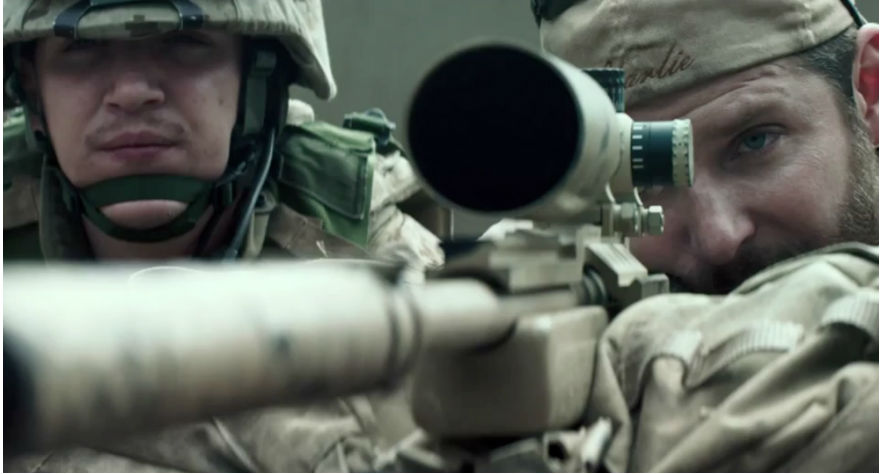
Eastwood and Cooper pay respects to late Navy SEAL Chris Kyle with a cerebral, intimate soldier's tale.

Eastwood and Cooper pay respects to late Navy SEAL Chris Kyle with a cerebral, intimate soldier's tale.
Over four tours of duty during the Iraq War, Navy SEAL Chris Kyle became the most legendary sniper in U.S. history, racking up 160 kills (earning him the fitting nickname “Legend” among his fellow soldiers). Clint Eastwood‘s haunting American Sniper at first chronicles the damage Kyle (played by a bulked-up, Southern twangy Bradley Cooper) inflicts upon enemies centered in the scope of his rifle, playing out like a slightly less-suspenseful Hurt Locker. But as the film drifts into its second half, it does something better than Hurt Locker did: we see the damage those 160 kills have on Kyle’s psyche, as Eastwood’s ground combat thriller transforms into a riveting paranoia piece and an intimate cautionary tale about the dehumanizing and mentally deteriorative effects of the horrors of the battlefield.
Cooper at first plays Kyle (who died before the film’s completion) like a big, burly bundle of stereotypes; he’s a beer-swiggin’ rodeo cowboy, a Southern charmer (we see him pick up dubious girl at a bar, Taya, played by Sienna Miller, later his wife), and a bigoted patriot (he calls Iraqis “savages”). He’s the poster child for down-home Americana, but what’s interesting about Kyle is how all of these traits inform his role as a sniper. We follow him from the moment he enlists in the military, and what’s immediately evident is that his single-minded dedication to his country makes him perfect behind the rifle; his scope is as unshakeable and narrow as his worldview and patriotism.
The series of raids, gunfights, and rooftop stakeouts that make up the first half of the movie are well-made, if a bit repetitive. Several times we see Kyle line up victims in his sights as the question of “to kill or not to kill” chews up his insides. Cooper is fantastic at communicating the unbearable weight of playing god with people’s lives; on two separate occasions he’s finds a child at the end of his barrel. He spares one, pulls the trigger on the other. He trembles and holds back tears for both. A somewhat overarching narrative eventually emerges about a deadly street boss called “The Butcher” and an Iraqi sniper with skills that rival Kyle’s, but the truth of the matter is, everything we see in Iraq is ultimately only meant to set up the real meat of the story, which is what we see when Kyle returns home to Taya and his son.
Eastwood and Cooper’s depiction of post-traumatic stress disorder is superb; back at the Kyle household we see the war-torn soldier sitting in front of his TV, staring blankly at the screen as people bustle in the backyard for his young son’s birthday party. Eastwood cuts to behind Kyle’s back to reveal that the TV is, in fact, not even turned on. It’s a chilling image of a lost soul dismantled. Late in the film we see a massive dust storm swallowing the streets of Fallujah, an injured Kyle racing to catch up with his comrades as they speed away in a Humvee. In a jaw-dropping shot from the perspective of the vehicle we see Kyle desperately reaching his arm out to his friends, barely visible in the dark cloud of dust. His humanity is hanging by a thread, nearly swallowed up by the void. The effect Kyle’s four tours have on his family isn’t handled as well. The film is told exclusively from his perspective, so while his high anxiety is expressed incredibly well cinematically, Taya’s anguish is communicated through rote dialogue about her husband not really being there, even when he’s present in the household.
As in Letters from Iwo Jima and Flags of Our Fathers, Eastwood explores the complexities and ambiguities of violence and the toll taking lives takes on the mind. Avoided are the intricacies of war politics; this is a story about one soldier, what he did and what he saw. The biggest thing Eastwood and screenwriter Jason Hall get right is how honest they are about the more unflattering aspects of Kyle’s character. He’s portrayed in a less than flattering light quite often, though his heroism is beyond question by the end of the film.
But American Sniper questions popular ideas about heroism in interesting ways most military movies don’t. While Kyle’s brothers in his platoon praise him as a hero for thinning enemy numbers, he clearly isn’t proud about that accomplishment; those 160 lives follow him around every day. What’s heroic about Kyle is his refusal to lose himself completely. Prior to his death last year, he had rebuilt himself to where he could be an attentive, loving father and husband, and even offered his services to aid fellow veterans in need of mental rehabilitation themselves. Tragically, Kyle’s life was taken by one of the veterans he was trying to help, a moment we don’t see on screen in good taste.
Originally published on Dec. 23, 2014.